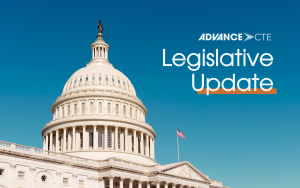 This week, House Education and the Workforce Committee leaders sharply rebuked the U.S. Department of Education’s (ED) recent regulatory proposal impacting the implementation of the Carl D. Perkins Career and Technical Education Act (Perkins V). Elsewhere, the Biden-Harris administration announced a new grant competition focused on leveraging Career Technical Education (CTE) for the semiconductor industry, while ED announced several new efforts to support postsecondary success and language acquisition.
This week, House Education and the Workforce Committee leaders sharply rebuked the U.S. Department of Education’s (ED) recent regulatory proposal impacting the implementation of the Carl D. Perkins Career and Technical Education Act (Perkins V). Elsewhere, the Biden-Harris administration announced a new grant competition focused on leveraging Career Technical Education (CTE) for the semiconductor industry, while ED announced several new efforts to support postsecondary success and language acquisition.
House Education Committee Questions ED’s CTE Regulatory Proposal
This week, leaders of the House Education and the Workforce Committee issued a formal response to the U.S. Department of Education’s (ED) recent regulatory proposal impacting state and local implementation of Perkins V. As shared previously, ED’s proposal would change Perkins V’s state plan requirements and related annual data collections and would result in every state and territory having to submit a new or amended Perkins V plan by 2026—a process that was just completed earlier this year. The Committee’s letter formally requests ED rescind these proposals and make use of other tools at the agency’s disposal to ensure compliance with the legislation. Read the full letter here.
Advance CTE and partners have continued to express significant concern regarding this proposal and plan to provide formal feedback next month in response. As a reminder, feedback related to proposed changes contained in ED’s Perkins V’s State Plan Guide is due November 12, 2024, while comments responsive to the law’s CAR Guide are now due November 26, 2024.
ED Announces CTE CHIPS Challenge
The U.S. Department of Education (ED) is launching the Career Technical Education (CTE) CHIPS Challenge – a new grant program that will award funding to CTE programs aligned with the CHIPS and Science Act. The effort is scheduled to last through 2028. Applicants should submit action plans for expanding student recruitment, training, and career placement in semiconductor fabrication and manufacturing pathways programs. ED will host a series of three information sessions for prospective applicants interested in applying for funding under this competition. The first informational session will occur on October 29th, 2024. For more details, visit CTE CHIPS Challenge.
ED Releases New Special Populations Resource
Last week, ED published the most recent installment in their learner playbook series, the English Learner Playbook: Unlocking Career Success for Special Populations. The playbook compiles resources for local leaders and includes recommendations for leveraging funds specifically for this population of learners. The resource also suggests strategies for how best to incorporate families and households to support career-connected learning. As part of ED’s wider “Raise the Bar” initiative, the Department has shared a series of playbooks related to certain special populations identified by the Carl D. Perkins Career and Technical Education Act (Perkins V).
Postsecondary Success Recognition Program Takes Shape
Earlier this month, the U.S. Department of Education (ED) opened applications for the Postsecondary Success Recognition Program – a new initiative that seeks to recognize postsecondary institutions that are setting a standard of excellence in supporting student postsecondary attainment and achievement as measured through efforts such as learner transfer, retention, completion, and career success. ED has identified a list of postsecondary institutions that will be eligible to apply for recognition. Applications are due to the Department by November 1, 2024, by 5 pm EST; review the materials here.

